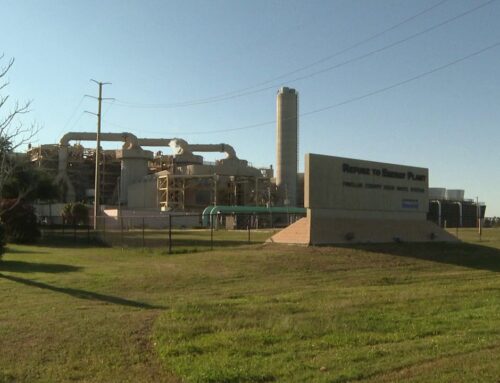‘Climate trigger’ formally ruled out of environment laws
October 22, 2025
‘Climate trigger’ formally ruled out of environment laws
In short:
A rewrite of Australia’s environment laws will not include a “climate trigger” that could block coal and gas projects, the minister has confirmed.
Instead, proponents of major projects will be required to disclose their expected emissions and provide a plan for how they intend to reduce them.
What’s next?
The legislation will be introduced in the next sitting fortnight.
A “climate trigger” that could be used to block coal and gas projects has been formally excluded from the government’s overhaul of Australia’s environment laws, minister Murray Watt has confirmed.
The decision not to write a “trigger” into the laws that could block projects that would worsen carbon emissions will anger the Greens and likely cut off that pathway for the government to pass its long-awaited rewrite of the Environment Protection and Biodiversity Conservation Act.
The government instead will force major projects to report their carbon emissions under the laws for the first time, as well as provide plans for how they intend to reduce those emissions to net zero by 2050.
“This is an important step forward to provide the community with confidence that proponents are taking their greenhouse gas emissions seriously,” Senator Watt said.
“This is [also] officially ruling out, in print, a climate trigger. But at the same time requiring proponents to do something they haven’t got to do currently.”
The country’s biggest polluters are already required to report emissions under the Safeguard Mechanism — but a swathe of industrial projects are not captured by that scheme.
The minister said the new scheme would be in line with the Safeguard Mechanism, which requires major emitters to cut their emissions by 5 per cent a year and reach net zero emissions by 2050.
Draft laws would require projects expected to emit more than 100,000 tonnes annually to disclose in their project proposals expected emissions, and a plan to reduce them.
The ABC understands the minister met again with his Coalition counterpart, Angie Bell, on Tuesday and negotiations have been progressing quickly.
Shadow Environment Minister Angie Bell said the Coalition was yet to see the full draft bill, but welcomed the government’s decision to rule out a climate trigger “after sustained pressure”.
She indicated that the government had also conceded to demands to ensure the environment minister had the final say over decision-making.
“Other critical Coalition-commissioned Graeme Samuel review recommendations that the Coalition has successfully fought for is ensuring decision making powers remain with the minister, along with an [Environment Protection Agency] limited to assurance, compliance and audit only — meaning the minister will be fully accountable,” Ms Bell said.
“By removing duplication, limiting climate reporting that is already included in other legislation and pushing for a Commonwealth offset, the Coalition has held this government to account when negotiating the right balance for the industry and environment.”
The government is still seeking broad support for its reforms, and has continued to meet with the Greens despite the impasse over a climate trigger.
“It’s a matter for both the Coalition and the Greens to decide whether they are prepared to support these reforms, I think it would be very unfortunate if the Greens were to proceed with not supporting these laws, which now require proponents for the first time to disclose their emissions,” Senator Watt said.
“There will be different views about this, I am sure there will be many parts of this legislation that people support and there will be parts [they] disagree with as well, but what we have tried to do is deliver a balanced package that delivers real gains for the environment and real gains for business.
“I have had the same number of meetings with the Coalition as I have had with the Greens, and we will continue working with both of them.”
The Greens have responded furiously to the proposed overhaul.
“We need environment laws that protect our forests and the climate; these laws do neither, they are not worth the paper they’re printed on,” Greens Environment spokesperson Sarah Hanson-Young said.
“The Greens have been very clear from the start. We will not rubber stamp laws that fail to protect our native forests, wildlife and climate.
“While industry will no doubt say they haven’t got enough, their grubby fingerprints are all over it. These laws are written to help big business and the mining companies, at the expense of nature.”
The minister said a “climate trigger” was not recommended under businessman Graeme Samuel’s major review of the environment laws, which concluded they were broken.
But the Coalition has pointed to comments by Anthony Albanese when he was shadow environment minister two decades ago, where he advocated for a climate trigger in Australian law.
Developments that breach act would be stripped of profits
Separately, Senator Watt has also confirmed that companies who breach the new environment laws could be stripped of the profits they made from that breach.
Penalties of up to $1.6 million on individuals and $825 million on businesses would be imposed for the most significant breaches.
Corporate offenders would be fined a maximum of either $16.5 million, three times the value of the benefit they derived from a breach, or 10 per cent of the business’s annual turnover — whichever is higher.
The laws will also create an emergency “stop work” power that would require developers to immediately cease actions potentially harming the environment.
Earlier this month, senators were told a Queensland coal project accused of illegally clearing koala habitat had been allowed to continue development because the environment department had “no authority” to force it to stop work.
The Gemini coal project in Dingo, central Queensland, is being investigated over the claim — but officials said existing laws did not give them powers to order a stop work until a finding was made.
Reforms due to be introduced to parliament in the next sitting fortnight will create emergency powers to respond to “major contraventions” of the law that create an imminent risk of serious harm to the environment, or where damage has already occurred.
“These new laws will not only allow an [Environment Protection Agency] to come down hard on these criminals, but also the power to immediately stop work to protect the environment,” Senator Watt said.
Search
RECENT PRESS RELEASES
Alcohol companies lobby Congress on cannabis drinks (Newsletter: October 22, 2025)
SWI Editorial Staff2025-10-22T03:30:55-07:00October 22, 2025|
Environmental groups call for change at Pinellas County’s decades-old waste-to-energy plan
SWI Editorial Staff2025-10-22T03:30:55-07:00October 22, 2025|
How Ravenna became home to a growing Bitcoin mine
SWI Editorial Staff2025-10-22T03:30:54-07:00October 22, 2025|
‘Climate trigger’ formally ruled out of environment laws
SWI Editorial Staff2025-10-22T03:30:27-07:00October 22, 2025|
West Virginia collected $34 million in cannabis taxes. It hasn’t spent a penny.
SWI Editorial Staff2025-10-22T03:30:13-07:00October 22, 2025|
Photographer captures timelapse of ‘red lightning’ in New Zealand
SWI Editorial Staff2025-10-22T03:29:58-07:00October 22, 2025|
Related Post



